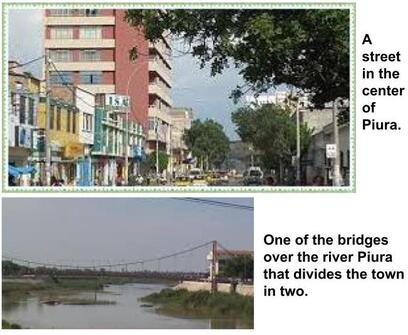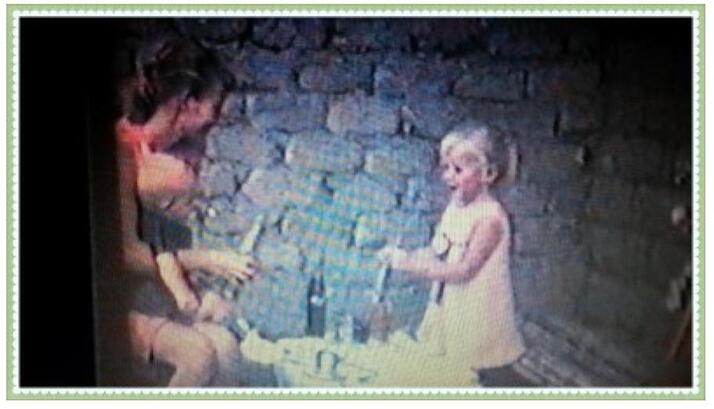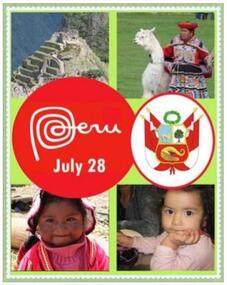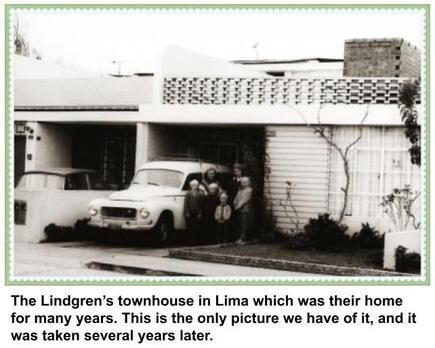Chapter 23: Preparing to Leave Bagua Chica
A trip to Piura, the Lindgrens come for a visit, and preparations begin for the move
AS TOLD BY JOHN AGERSTEN
After returning from our vacation in Huancayo, we stayed very busy with services both in the small group which was growing steadily and with visiting villages around Bagua. Gro wrote in a letter home on June 14th:
”John is traveling again, but fortunately not very far. He left Thursday morning and will be home Monday afternoon. He had to travel about half an hour with the jeep, and then one to two hours by riding a horse or donkey. Next Thursday, he’ll travel again to another village that has requested a visit. He will be gone until the following Monday then as well. But this time he will have to horseback ride for about 5 hours. He has promised a second visit there in a couple of weeks to hold revival services. So the calendar is packed. Since there are no roads to these villages, the children and I cannot go with him, and besides that, the food and sleeping conditions are very primitive, so it would be particularly difficult with the children.
In any case, I have plenty to do here, although it is not easy for me to hold the services alone anymore. When Lewi was smaller, he would sleep in his stroller most of the service, but he won’t do that anymore. Now he gets impatient with sitting there while I teach or preach. Two Sundays ago we arranged an outing with the Sunday School. It went well, and everyone had fun, but we felt like we had been baked in the strong sunshine by the time we got home.”
”John is traveling again, but fortunately not very far. He left Thursday morning and will be home Monday afternoon. He had to travel about half an hour with the jeep, and then one to two hours by riding a horse or donkey. Next Thursday, he’ll travel again to another village that has requested a visit. He will be gone until the following Monday then as well. But this time he will have to horseback ride for about 5 hours. He has promised a second visit there in a couple of weeks to hold revival services. So the calendar is packed. Since there are no roads to these villages, the children and I cannot go with him, and besides that, the food and sleeping conditions are very primitive, so it would be particularly difficult with the children.
In any case, I have plenty to do here, although it is not easy for me to hold the services alone anymore. When Lewi was smaller, he would sleep in his stroller most of the service, but he won’t do that anymore. Now he gets impatient with sitting there while I teach or preach. Two Sundays ago we arranged an outing with the Sunday School. It went well, and everyone had fun, but we felt like we had been baked in the strong sunshine by the time we got home.”

A trip to Piura
In the beginning of July ‘69, we decided to take a trip to Piura. Piura is a large town on the coast a few miles north of Chiclayo, an even larger town. We met an American baptist missionary from Houston that lived with his family in Piura when he had come to visit Bagua a while ago. He was in charge of the Baptist church in Bagua, Piura and area, and a few other places inland in the north. We had invited him home since the church was close to our house and we had visited several of their satellite groups by invitation of the pastor. We really enjoyed getting to know him. He invited us to visit them in Piura sometime.
We had already been thinking about taking a trip to the coast. We needed to do some shopping and also get some work done on the Jeep before we sold it. We would not need it where we were moving since there were no roads. These things could be taken care of in Piura instead of in Chiclayo where we usually went, and we could drop by and visit the missionary family while we were there. It was an 280-mile trip, but at least the roads were dry now. But as we crossed the mountains and were about to turn off toward Piura, Gro started to feel sick. She had a really bad headache that worsened as we got closer to Piura. She was nauseated as well, and we were glad to see an acceptable hotel that also fit our budget as the road came into Piura. We checked in, and Gro laid down in bed as soon as we got to our room. She was now running a fever, and both her head and her neck were hurting badly. Then she had to throw up, and she was so weak that I had to help her from the bathroom back to her bed.
In the beginning of July ‘69, we decided to take a trip to Piura. Piura is a large town on the coast a few miles north of Chiclayo, an even larger town. We met an American baptist missionary from Houston that lived with his family in Piura when he had come to visit Bagua a while ago. He was in charge of the Baptist church in Bagua, Piura and area, and a few other places inland in the north. We had invited him home since the church was close to our house and we had visited several of their satellite groups by invitation of the pastor. We really enjoyed getting to know him. He invited us to visit them in Piura sometime.
We had already been thinking about taking a trip to the coast. We needed to do some shopping and also get some work done on the Jeep before we sold it. We would not need it where we were moving since there were no roads. These things could be taken care of in Piura instead of in Chiclayo where we usually went, and we could drop by and visit the missionary family while we were there. It was an 280-mile trip, but at least the roads were dry now. But as we crossed the mountains and were about to turn off toward Piura, Gro started to feel sick. She had a really bad headache that worsened as we got closer to Piura. She was nauseated as well, and we were glad to see an acceptable hotel that also fit our budget as the road came into Piura. We checked in, and Gro laid down in bed as soon as we got to our room. She was now running a fever, and both her head and her neck were hurting badly. Then she had to throw up, and she was so weak that I had to help her from the bathroom back to her bed.

The only person we knew in town was the American missionary. I had his card with an address and phone number. I called him to see if he could recommend a doctor for Gro, and he wanted to know where we were. He came right away and could tell immediately that Gro was really sick, so he insisted that we come home with him. They had a big house, and his wife welcomed us with open arms, and she fixed up a bed for Gro right away. I had never seen her so sick. The missionary called their doctor, and he came that afternoon. He said she had a major infection. He was worried that it was meningitis and gave her strong antibiotics and other medication. She was very sick for three days with a high fever and a stiff neck and a headache. She mostly slept and seemed unconscious part of the time. Both we and the church were praying for her, and on the fourth day, she felt better. After a few more days, she was well again.
As Gro improved, I was able to go and take care of the things we had planned to do. Our new friends took care of her and the children while I was out on my errands. They had a daughter about Maino’s age, and they played well together. We were so thankful for this hospitable and loving family who had opened their home to us and taken such great care of us. We were also grateful that Gro had not gotten ill in Bagua, where medical help would have been practically nonexistent. We saw it as God’s hand in leading us to go to Piura at just this time. We had ended up staying longer than we had planned, but it was with grateful hearts that we headed back to Bagua.
As Gro improved, I was able to go and take care of the things we had planned to do. Our new friends took care of her and the children while I was out on my errands. They had a daughter about Maino’s age, and they played well together. We were so thankful for this hospitable and loving family who had opened their home to us and taken such great care of us. We were also grateful that Gro had not gotten ill in Bagua, where medical help would have been practically nonexistent. We saw it as God’s hand in leading us to go to Piura at just this time. We had ended up staying longer than we had planned, but it was with grateful hearts that we headed back to Bagua.

Lewi’s first Birthday
There was a lot to do back in Bagua, both with services and preparations for the move. We had a sweet celebration of Lewi’s first birthday on the 17th of July, not long after we got back from Piura. We enjoyed the day in our little backyard with sodas and cake. The cake had a sugar glaze and a delicious fruit filling; we could not get heavy cream for a whipped cream here. A couple of young girls from the church came to visit and had cake and soda, too, an extremely rare treat for them. We have a little film from this celebration, but not many pictures. Besides, many of our pictures from Bagua were ruined by the humidity during that first period in the jungle.
There was a lot to do back in Bagua, both with services and preparations for the move. We had a sweet celebration of Lewi’s first birthday on the 17th of July, not long after we got back from Piura. We enjoyed the day in our little backyard with sodas and cake. The cake had a sugar glaze and a delicious fruit filling; we could not get heavy cream for a whipped cream here. A couple of young girls from the church came to visit and had cake and soda, too, an extremely rare treat for them. We have a little film from this celebration, but not many pictures. Besides, many of our pictures from Bagua were ruined by the humidity during that first period in the jungle.

Peruvian Independence Day July 28th
The Peruvian Independence day is the 28th of July. In every home, people had hung up cardboard or paper flags. Very few people owned actual fabric flags, and those that did had sewed them themselves. There were no fabricated flags in the stores here in Bagua. Still, everyone found a way to hang a flag outside their houses. We could hear a brass band in the distance, but there was no parade. We had seen parades on the two previous Independence days we had celebrated in Peru, but military government that had come to power through a coup last fall, were not allowing large gatherings or marching of any kind. At least the brass band was still allowed to play the National Anthem. The military government was making several changes and new laws, for example, they took over many foreign industries and businesses here in Peru. We did not notice many of the changes here in Bagua, except that some things were harder to get, like flour and sugar.
The Peruvian Independence day is the 28th of July. In every home, people had hung up cardboard or paper flags. Very few people owned actual fabric flags, and those that did had sewed them themselves. There were no fabricated flags in the stores here in Bagua. Still, everyone found a way to hang a flag outside their houses. We could hear a brass band in the distance, but there was no parade. We had seen parades on the two previous Independence days we had celebrated in Peru, but military government that had come to power through a coup last fall, were not allowing large gatherings or marching of any kind. At least the brass band was still allowed to play the National Anthem. The military government was making several changes and new laws, for example, they took over many foreign industries and businesses here in Peru. We did not notice many of the changes here in Bagua, except that some things were harder to get, like flour and sugar.

We start preparing for the move.
In the midst of all these activities, we started preparing for our move into the lowland jungle. Throughout July, we sold much of our furniture as there would not be room for those on the boat that would move our things down the Marañon river and past the Pongo de Manseriche. As we sold the furniture, it was agreed that we would keep them until the actual move. We had heard it was hard to get propane gas in the jungle, so we exchanged our gas stove for a paraffin one. Our refrigerator was already paraffin, so that would go on the moving boat, along with some furniture that could be packed flat, such as our beds.
We had also arranged to sell the Jeep to a brother in the church that had a business selling building materials. He paid half up front, and we would keep the Jeep till he had the second half. We got a little more for it than we had originally paid for it, but we also had put quite a bit of money into it for repairs and upkeep. The sale of the Jeep would release funds for the building of a boat and a motor. I was planning to travel to Yurimaguas, a larger village on the river Huallaga. Huallaga runs into the Marañon in the lowland jungle further down. We had heard there were good opportunities to buy and rebuild a boat there that would be suitable for us to live in for a short while. Yurimaguas was the capital of the province Alto Amazonas, which is the area where we planned to live and work.
A Visit from the Lindgrens
As July turned into August , the Lindgrens came to visit with their boys David and Samuel. We had received notification of their visit a few days in advance and had been looking forward to it. It was a very enjoyable visit. The children had a lot of fun together, and Lennard accompanied me on a couple of visits to villages as well. We were very glad that we still had the furniture and the Jeep while they were visiting. It would have been a little sad if they had come to a half-empty house.
They were about to move themselves. They had now rented a townhouse in the Magdalena del Mar district of Lima. They were planning to start a church in that area since they had discovered that there weren’t any evangelical ministries in this area of Lima. Lima is a huge city with millions, so of course, there were churches and ministries in other parts of the city. Many American and English missionaries had started work here and elsewhere in Peru many years ago, but there was still a great need for missionaries and native workers in certain districts and suburbs of the city. During the Spanish occupation, only Catholic missions were allowed, but even after that, evangelical Christians and missionaries endured severe persecution for a few years. Now, however, there was a great openness and acceptance of the Gospel, and great opportunities to reach people with the good news.
The Lindgrens invited Gro and the children to come and stay with them in Lima, whenever I went to Yurimaguas to start building the boat. We weren’t sure yet when that would be, but hoped to be ready for that next step by the end of August. It depended, among other things, when the brother who was buying the Jeep would have enough for the second half of the payment. I comforted Maino as we waved goodbye to the Lindgrens that we would see them again soon.
After the Lindgrens left, we packed up the things we would be moving in barrels and boxes. We rented a room across the street where we would be able to store it while I went to Yurimaguas and Gro and the children stayed in Lima with the Lindgrens. It was a windowless room, but cheaper and more secure than the house we were living in. We were only planning to be in Bagua two or three days when we returned to get our things and travel on into the jungle.
And so it was that on the 18th of August we said farewell to the church group in Bagua, and I headed to Yurimaguas, and Gro and the children went to Lima. We reflected on the goodness of God and how He prepares and equipped us each individually for the work He has laid before us.
In the midst of all these activities, we started preparing for our move into the lowland jungle. Throughout July, we sold much of our furniture as there would not be room for those on the boat that would move our things down the Marañon river and past the Pongo de Manseriche. As we sold the furniture, it was agreed that we would keep them until the actual move. We had heard it was hard to get propane gas in the jungle, so we exchanged our gas stove for a paraffin one. Our refrigerator was already paraffin, so that would go on the moving boat, along with some furniture that could be packed flat, such as our beds.
We had also arranged to sell the Jeep to a brother in the church that had a business selling building materials. He paid half up front, and we would keep the Jeep till he had the second half. We got a little more for it than we had originally paid for it, but we also had put quite a bit of money into it for repairs and upkeep. The sale of the Jeep would release funds for the building of a boat and a motor. I was planning to travel to Yurimaguas, a larger village on the river Huallaga. Huallaga runs into the Marañon in the lowland jungle further down. We had heard there were good opportunities to buy and rebuild a boat there that would be suitable for us to live in for a short while. Yurimaguas was the capital of the province Alto Amazonas, which is the area where we planned to live and work.
A Visit from the Lindgrens
As July turned into August , the Lindgrens came to visit with their boys David and Samuel. We had received notification of their visit a few days in advance and had been looking forward to it. It was a very enjoyable visit. The children had a lot of fun together, and Lennard accompanied me on a couple of visits to villages as well. We were very glad that we still had the furniture and the Jeep while they were visiting. It would have been a little sad if they had come to a half-empty house.
They were about to move themselves. They had now rented a townhouse in the Magdalena del Mar district of Lima. They were planning to start a church in that area since they had discovered that there weren’t any evangelical ministries in this area of Lima. Lima is a huge city with millions, so of course, there were churches and ministries in other parts of the city. Many American and English missionaries had started work here and elsewhere in Peru many years ago, but there was still a great need for missionaries and native workers in certain districts and suburbs of the city. During the Spanish occupation, only Catholic missions were allowed, but even after that, evangelical Christians and missionaries endured severe persecution for a few years. Now, however, there was a great openness and acceptance of the Gospel, and great opportunities to reach people with the good news.
The Lindgrens invited Gro and the children to come and stay with them in Lima, whenever I went to Yurimaguas to start building the boat. We weren’t sure yet when that would be, but hoped to be ready for that next step by the end of August. It depended, among other things, when the brother who was buying the Jeep would have enough for the second half of the payment. I comforted Maino as we waved goodbye to the Lindgrens that we would see them again soon.
After the Lindgrens left, we packed up the things we would be moving in barrels and boxes. We rented a room across the street where we would be able to store it while I went to Yurimaguas and Gro and the children stayed in Lima with the Lindgrens. It was a windowless room, but cheaper and more secure than the house we were living in. We were only planning to be in Bagua two or three days when we returned to get our things and travel on into the jungle.
And so it was that on the 18th of August we said farewell to the church group in Bagua, and I headed to Yurimaguas, and Gro and the children went to Lima. We reflected on the goodness of God and how He prepares and equipped us each individually for the work He has laid before us.